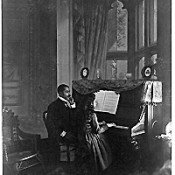
Traditionally, we teachers learned to play the piano when we were young. We felt very differently about our various teachers than adults do. Our youthful models of teacher-student relationships are of limited use in our dealings with adult students.
Kids are well trained to respond to teachers’ authority and they defy this authority at their peril. Adults, on the other hand, present a much more complex situation. It behooves us as teachers of adult students to carefully examine our feelings about our own authority when faced with another adult.
A good barometer of this sense of authority is our system of charging for lessons. Money is always a touchy issue. I’ve talked with many teachers who have trouble with this. They wonder if they should charge adults as much as they charge children. They wonder if they should be more lenient with adults’ busy schedules and not charge for missed lessons.
Even raising the questions indicates a problem.
My viewpoint is that I am selling little bits of my life and that the fee is the same for all students and I expect payment for missed lessons. If I have time during the week of the missed lesson, I will try to make the lesson up but I am under no obligation to do so. I make this known in a written statement that I give all my students when they begin to study with me.
Another barometer of authority is the expectations we have of the adults we teach. Some teachers are weak about establishing demands and just offer gratuitous praise. They aren’t demanding at all. Their students don’t learn much. On the other hand, some teachers are so unrealistic in their demands that their students always feel inadequate and as a result, never gain any confidence. Finding the middle ground with each student takes time and attention so appropriate demands are found.
Another issue of authority presents itself with the anger adult students show. Children are not allowed full expression of their anger with teachers. If they do, most regard it as a behavior problem of the child. Teachers must deal with the anger of adult students very differently. After all, we can’t call their parents.
Anger and frustration are important elements in learning. In my experience, students’ willingness to express these uncomfortable emotions usually is a forerunner of a significant leap of progress in their playing. My own totally unexpected experience of rage as a “temporary” student of my friend is discussed in What I Learned About Teaching Children from Teaching Adults.
Anger is uncomfortable for students and teachers alike. It is important that we be willing to listen to our students’ anger. To do so without defensiveness but maintaining the clarity of our intent is crucial. In fact, we can usually learn as much as students from these encounters.
The same is true of frustration. It’s easier to sit with a child in tears than to sit with another adult who is crying. Tears are a part of frustration and the ability to sit with the tears of a student without trying to artificially console the student is uncomfortable at best. Being able to sit with students in this experience affirms their faith in our real and honest support of their endeavor.
Young teachers may feel a very real challenge to their own feelings of authority when they work with students old enough to be their parents. It’s hard to hold one’s own authority looking into the face of one’s elders as they imply you don’t know what you’re talking about. It’s an unavoidable problem. It will go away with time (an advantage of aging). In the meantime, the best thing to do is be very sure of yourself or be very honest if you are not sure.
The best way we can to carry authority is to be the best teacher we can be. Real authority isn’t bossy and it isn’t insistent about being right all the time. Real authority bides its time, waiting for the best moment, being willing to defer that moment if we pushed too soon. Real authority is not embarrassed about not knowing everything. Real authority comes from knowing one’s self, knowing music, understanding how to teach people to play the piano and from taking the time to know our students.
